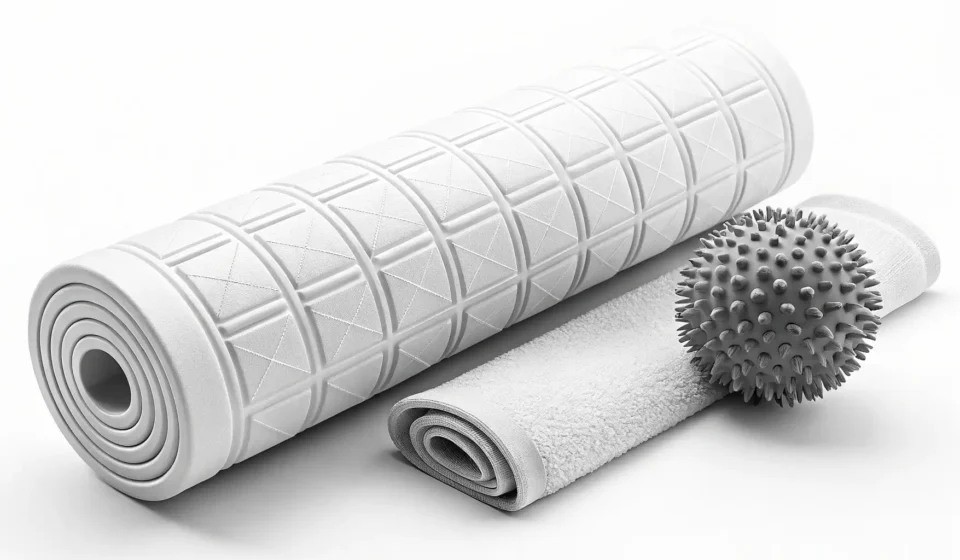
How to Say Myofascial Release in Korean
Understanding health and wellness terms is crucial when discussing physical therapy, fitness, or self-care in Korean. This guide focuses on “myofascial release,” explaining the core term and providing related vocabulary and phrases commonly used in physical therapy clinics, gyms, or conversations about muscle health in Korea.
Table Of Content
Core Term
-
Expression: 근막이완
Pronunciation: geun-mak-i-wan
Meaning: Myofascial release (literally “fascia relaxation/release”)
Related Vocabulary
-
Expression: 근육
Pronunciation: geun-yuk
Meaning: Muscle -
Expression: 통증
Pronunciation: tong-jjeung
Meaning: Pain -
Expression: 스트레칭
Pronunciation: seu-teu-re-ching
Meaning: Stretching -
Expression: 마사지
Pronunciation: ma-sa-ji
Meaning: Massage -
Expression: 치료
Pronunciation: chi-ryo
Meaning: Treatment, Therapy -
Expression: 폼롤러
Pronunciation: pom-rol-leo
Meaning: Foam roller -
Expression: 마사지 볼
Pronunciation: ma-sa-ji bol
Meaning: Massage ball -
Expression: 이완
Pronunciation: i-wan
Meaning: Relaxation, Release -
Expression: 긴장
Pronunciation: gin-jang
Meaning: Tension -
Expression: 유연성
Pronunciation: yu-yeon-seong
Meaning: Flexibility -
Expression: 자세
Pronunciation: ja-se
Meaning: Posture -
Expression: 전문가
Pronunciation: jeon-mun-ga
Meaning: Expert, Specialist
Describing Sensations
-
Expression: 아파요.
Pronunciation: a-pa-yo
Meaning: It hurts. -
Expression: 시원해요.
Pronunciation: si-won-hae-yo
Meaning: It feels refreshing / relieving. (Commonly used for good pain/release) -
Expression: 근육이 뭉쳤어요.
Pronunciation: geun-yuk-i mung-cheoss-eo-yo
Meaning: My muscles are tight/knotted. -
Expression: 근육이 풀리는 느낌이에요.
Pronunciation: geun-yuk-i pul-li-neun neu-kkim-i-e-yo
Meaning: It feels like my muscles are releasing. -
Expression: 여기가 특히 아파요.
Pronunciation: yeo-gi-ga teuk-hi a-pa-yo
Meaning: It hurts particularly here. -
Expression: 좀 더 세게 해주세요.
Pronunciation: jom deo se-ge hae-ju-se-yo
Meaning: Please do it a bit stronger. -
Expression: 좀 더 약하게 해주세요.
Pronunciation: jom deo yak-ha-ge hae-ju-se-yo
Meaning: Please do it a bit gentler. -
Expression: 몸이 가벼워졌어요.
Pronunciation: mom-i ga-byeo-wo-jyeoss-eo-yo
Meaning: My body feels lighter. -
Expression: 통증이 줄었어요.
Pronunciation: tong-jjeung-i jul-eoss-eo-yo
Meaning: The pain has decreased. -
Expression: 이 부위가 뻐근해요.
Pronunciation: i bu-wi-ga ppeo-geun-hae-yo
Meaning: This area feels stiff/sore. -
Expression: 압력이 적당해요.
Pronunciation: am-nyeok-i jeok-dang-hae-yo
Meaning: The pressure is just right. -
Expression: 긴장이 풀리는 것 같아요.
Pronunciation: gin-jang-i pul-li-neun geot gat-a-yo
Meaning: I think the tension is being released.
Asking About Myofascial Release
-
Expression: 근막이완을 받고 싶어요.
Pronunciation: geun-mak-i-wan-eul bat-go sip-eo-yo
Meaning: I want to receive myofascial release. -
Expression: 근막이완이 효과가 있나요?
Pronunciation: geun-mak-i-wan-i hyo-gwa-ga iss-na-yo?
Meaning: Is myofascial release effective? -
Expression: 어디가 불편하세요?
Pronunciation: eo-di-ga bul-pyeon-ha-se-yo?
Meaning: Where are you experiencing discomfort? / Where does it bother you? -
Expression: 폼롤러로 근막이완을 해요.
Pronunciation: pom-rol-leo-ro geun-mak-i-wan-eul hae-yo
Meaning: I do myofascial release with a foam roller. -
Expression: 전문가에게 근막이완을 받는 것이 좋아요.
Pronunciation: jeon-mun-ga-e-ge geun-mak-i-wan-eul bat-neun geos-i jo-a-yo
Meaning: It’s good to receive myofascial release from a specialist. -
Expression: 셀프 근막이완 방법을 알려주세요.
Pronunciation: sel-peu geun-mak-i-wan bang-beop-eul al-lyeo-ju-se-yo
Meaning: Please tell me how to do self-myofascial release. -
Expression: 운동 후에 근막이완을 하는 것이 도움이 돼요.
Pronunciation: un-dong hu-e geun-mak-i-wan-eul ha-neun geos-i do-um-i dwae-yo
Meaning: Doing myofascial release after exercise is helpful. -
Expression: 근막이완은 얼마나 자주 해야 하나요?
Pronunciation: geun-mak-i-wan-eun eol-ma-na ja-ju hae-ya ha-na-yo?
Meaning: How often should I do myofascial release? -
Expression: 통증 완화에 도움이 돼요.
Pronunciation: tong-jjeung wan-hwa-e do-um-i dwae-yo
Meaning: It helps relieve pain. -
Expression: 자세 교정에도 좋아요.
Pronunciation: ja-se gyo-jeong-e-do jo-a-yo
Meaning: It’s also good for posture correction. -
Expression: 이 부위에 근막이완이 필요해요.
Pronunciation: i bu-wi-e geun-mak-i-wan-i pil-yo-hae-yo
Meaning: Myofascial release is needed in this area. -
Expression: 근막이완 도구를 추천해 주세요.
Pronunciation: geun-mak-i-wan do-gu-reul chu-cheon-hae ju-se-yo
Meaning: Please recommend a myofascial release tool.
Korean Culture Notes
Self-care and wellness are increasingly popular in Korea. Many people incorporate practices like stretching, foam rolling, and using massage tools into their routines. You’ll find foam rollers (폼롤러 – pom-rol-leo) and massage balls (마사지 볼 – ma-sa-ji bol) readily available in stores and commonly used in homes and gyms.
Physical therapy clinics (물리치료실 – mul-li-chi-ryo-sil) and specialized sports massage centers often offer myofascial release (근막이완 – geun-mak-i-wan) as part of their treatment plans. Awareness of this term is quite high among health-conscious individuals and athletes.
The expression 시원하다 (si-won-ha-da) is frequently used to describe the feeling of relief or release after a good stretch, massage, or myofascial release session. It conveys a sense of “refreshing release” or “good pain” that alleviates tension, even if the process itself involves some discomfort.
Discussing physical discomfort or pain (통증 – tong-jjeung) openly with therapists or trainers is common and expected, so don’t hesitate to point out specific areas (부위 – bu-wi) that need attention.
Real Conversation Example
Situation: Minjun (A) is visiting a physical therapist, Ms. Kim (B), due to shoulder pain.
Roles: A = Minjun (Patient), B = Ms. Kim (Physical Therapist)
-
Expression: A: 안녕하세요, 어깨 통증 때문에 왔어요. 특히 이쪽 근육이 많이 뭉쳤어요.
Pronunciation: A: an-nyeong-ha-se-yo, eo-kkae tong-jjeung ttae-mun-e wass-eo-yo. teuk-hi i-jjok geun-yuk-i ma-ni mung-cheoss-eo-yo.
Meaning: A: Hello, I came because of shoulder pain. The muscles on this side, in particular, are very tight. -
Expression: B: 네, 어디 한번 볼까요? 아, 여기가 많이 긴장되어 있네요. 근막이완 치료를 좀 해볼게요.
Pronunciation: B: ne, eo-di han-beon bol-kka-yo? a, yeo-gi-ga ma-ni gin-jang-doe-eo iss-ne-yo. geun-mak-i-wan chi-ryo-reul jom hae-bol-ge-yo.
Meaning: B: Okay, let me take a look. Ah, this area is very tense. Let’s try some myofascial release therapy. -
Expression: A: 근막이완이요? 좀 아픈가요?
Pronunciation: A: geun-mak-i-wan-i-yo? jom a-peun-ga-yo?
Meaning: A: Myofascial release? Is it a bit painful? -
Expression: B: 네, 뭉친 부분을 풀 때 약간 아플 수 있는데, 끝나고 나면 훨씬 시원하고 가벼워지실 거예요. 압력이 너무 세면 말씀해주세요.
Pronunciation: B: ne, mung-chin bu-bun-eul pul ttae yak-gan a-peul su iss-neun-de, kkeut-na-go na-myeon hwol-ssin si-won-ha-go ga-byeo-wo-ji-sil geo-ye-yo. am-nyeok-i neo-mu se-myeon mal-sseum-hae-ju-se-yo.
Meaning: B: Yes, it might hurt a little when releasing the knotted areas, but you’ll feel much more refreshed and lighter afterward. Please tell me if the pressure is too strong. -
Expression: A: (치료 중) 아… 거기가 좀 아프면서 시원하네요.
Pronunciation: A: (chi-ryo jung) a… geo-gi-ga jom a-peu-myeon-seo si-won-ha-ne-yo.
Meaning: A: (During treatment) Ah… that spot hurts a bit but feels relieving at the same time. -
Expression: B: 네, 그 부분이 많이 뭉쳐 있었어요. 이제 좀 어떠세요?
Pronunciation: B: ne, geu bu-bun-i ma-ni mung-chyeo iss-eoss-eo-yo. i-je jom eo-tteo-se-yo?
Meaning: B: Yes, that area was very tight. How does it feel now? -
Expression: A: 와, 정말 어깨가 훨씬 가벼워졌어요. 통증도 줄었고요.
Pronunciation: A: wa, jeong-mal eo-kkae-ga hwol-ssin ga-byeo-wo-jyeoss-eo-yo. tong-jjeung-do jul-eoss-go-yo.
Meaning: A: Wow, my shoulder really feels much lighter. The pain has decreased too.
Practice Tips
Now you know how to talk about myofascial release (근막이완 – geun-mak-i-wan) in Korean! Try using these phrases next time you’re at the gym, visiting a physical therapist, or even just foam rolling at home~ Practice describing where you feel tight (뭉쳤어요 – mung-cheoss-eo-yo) or where it hurts (아파요 – a-pa-yo).
Listen carefully to how therapists or trainers use these terms. Don’t be afraid to ask questions like “근막이완이 효과가 있나요?” (geun-mak-i-wan-i hyo-gwa-ga iss-na-yo?) or describe the feeling as “시원해요” (si-won-hae-yo!). Keep practicing, and you’ll be discussing your wellness routine in Korean confidently! Fighting! (화이팅! – hwa-i-ting!)






